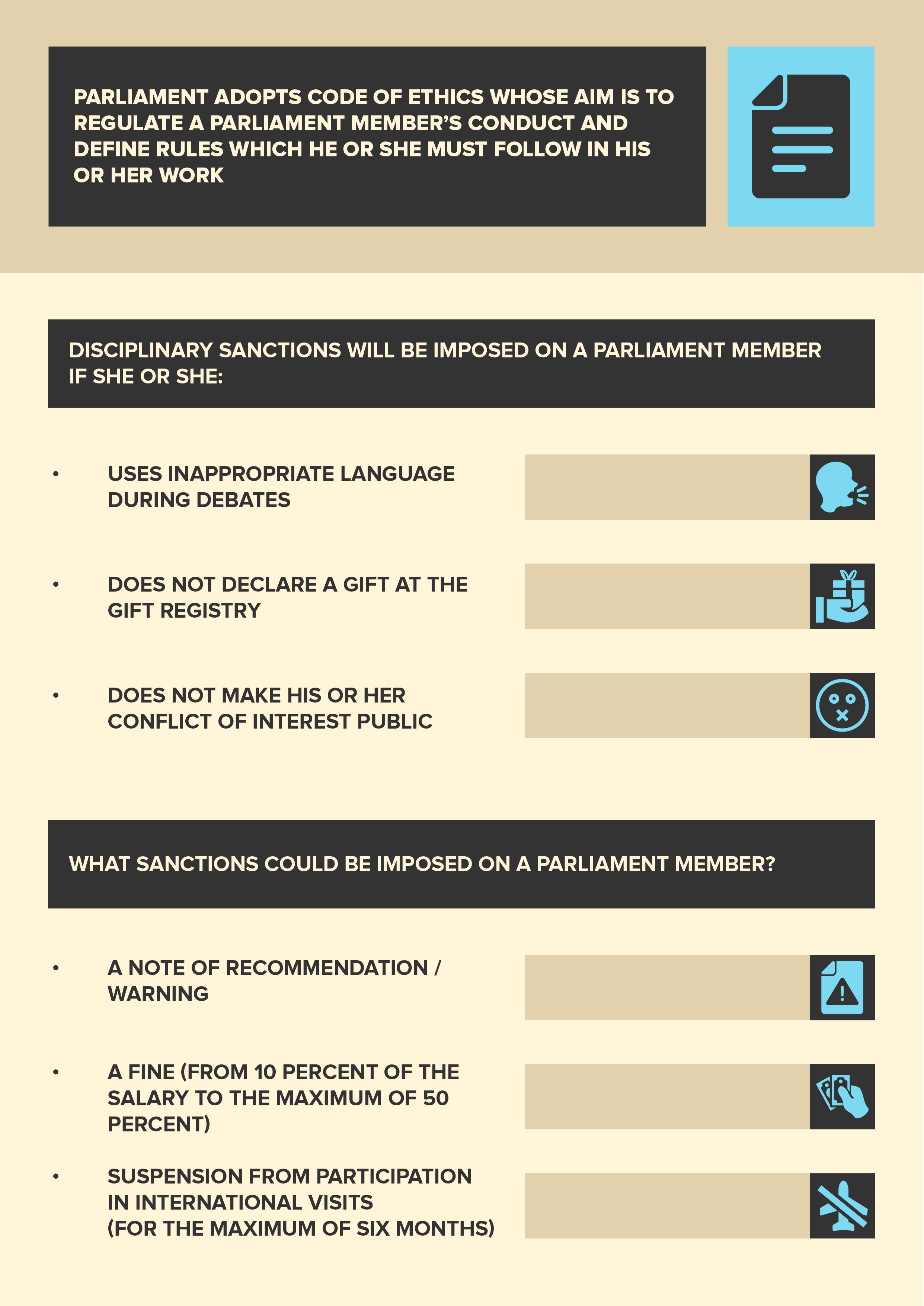The site is being updated.
- Join Us
-

- Georgian
Parliament of Georgia Needs To Adopt Code of Ethics in the Nearest Future
On 20 December, at the meeting with government membership candidates, the public witnessed a confrontation during which politicians spoke emotionally and unethically. Despite the fact that confrontations and mutual insults are a frequent occurrence in the legislative body, the 20 December session was particularly unethical and especially aggressive, which tarnishes the Parliament’s reputation and sets a bad example for the public. We believe that such behaviour on the part of politicians who have an obligation to remain patient is inadmissible. This incident confirms that standards of ethical conduct need to be established for politicians and parliament members.
At the Bureau session held on 14 December 2017, parliament members’ initiative regarding the approval of a new Code of Ethicswas registered.[1] This document was elaborated by the Permanent Parliamentary Council on Open and Transparent Governanceand has remained the subject of advocacy by non-governmental organizations for years. The document was developed in cooperation with non-governmental organizations, within the framework of Open Parliament Georgia 2017 Action Plan.
The goal of the initiated draft Code of Ethics is to regulate a parliament member’s conduct and define rules which he or she must follow in his or her work as well as with colleagues, staff, the media, other institutions and when communicating with the public both inside and outside the parliament building. One of the most important components of the presented Code of Ethics are its disciplinary actions, which determine responsibility for violating ethical norms.

Rules of Conduct determined by the Code of Ethics
A parliament member is obliged:
- To be respectful when addressing other parliament members and citizens and to use appropriate language when communicating with citizens, during public appearances and parliamentary debates. It is inadmissible to resort to insulting actions infringing upon honour and dignity, use obscene language, make sexist, discriminatory comments and statements and to use hate speech.
- To publicly declare his own or his family members’ personal or business-related interests; furthermore, to notify the Procedural Issues and Rules Committee about these interests in writing so that the Committee can publish this information on the parliamentary website.
- To declare at the gift registry a gift whose market value exceeds GEL 300, as stipulated by the Georgian legislation, within one month from receiving it.
- To have transparent relations with registered lobbyists – information about meetings must be published on the parliament website.
Rules of Staffing the Ethics Council
In order to address the violations of the Code of Ethics, an Ethics Council is established in parliament. It discusses alleged violations of the Code on its own initiative or in response to a complaint. A special form of complaint regarding a violation of the Code can be submitted by a parliament member/members and by a person who believes that he or she was a victim of the Code violation.
The Ethics Council is led by two co-chairpersons (one from the majority and one from the minority or other opposition faction), who are elected by the Ethics Council members. The composition of the Ethics Council is determined in proportion to the number of parliament members united into factions or the number of parliament members who are not members of any faction.
The number of representatives of the majority on the Council is not to be more than one half of the number of the Commission members which makes it impossible for the ruling team to dominate the decision-making process in the Council.
Disciplinary Sanctions
Disciplinary sanctions can include:
a) A note of recommendation / warning;
b) A fine (from 10 percent of the salary to the maximum of 50 percent);
c) Suspension from participation in international visits (for the maximum of six months).
One disciplinary misconduct could warrant only one sanction. The use of disciplinary sanctions should be based on the principle of proportionality.
Evaluation / Recommendations
It is the opinion of Transparency International – Georgia that the adoption of the aforementioned document would be a step forward for parliament members and politicians in general with regard to ethical behaviour although we believe that the document should also regulate several other important issues:
- Any citizens, whether or not he or she believes that a violation of provisions of the Code of Ethics were directed against him or her personally, should be able to file a complaint against a parliament member concerning violation of the Code of Ethics. Such practice exists in the UK.
- Parliament members should be obliged to refrain from participating in the vote in the event of the conflict of interest. For example, such regulation exists in Sweden and Canada.
- It is important to determine an efficient mechanism of monitoring the work of the Ethics Council (for example, the Ethics Council could be composed of not only parliament members but also of the representatives of the civil society, or experts could become involved in the work of the council as observers). For example, in France, the commissionaire who reviews violations of the norms of ethics by parliament members is not a parliament member.
- The Code of Ethics and the complaint form should be available from the Parliament’s website.
- Information about disciplinary sanctions imposed on parliament members should be published on the official website of the Parliament.
My Parliament
Here you can find information about your representatives in Parliament and the decisions they make on your behalf.




